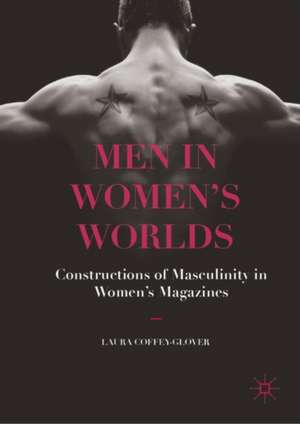Men in Women's Worlds: Constructions of Masculinity in Women's Magazines
Autor Laura Coffey-Gloveren Limba Engleză Hardback – 24 ian 2019
This book presents an analysis of masculinity construction in a large corpus of women’s magazines, adopting a feminist Critical Stylistic approach to reveal how men are talked about and ‘sold’ to women as part of a successful performance of hegemonic femininity. This novel approach identifies women’s magazines as sites of ‘lad culture’ that perpetuate ideologies more commonly associated with the ‘laddism’ of male-targeted media. It examines how stereotypical images of men as naturally aggressive and obsessed with sex are promoted, as well as considering some of the ways in which women’s magazines contribute to the social construction of normative understandings of gender and sexuality more broadly. This engaging work will offer fresh insights to students and scholars of (Critical) Discourse Analysis, Sociolinguistics, Corpus Linguistics, Stylistics, and Gender and Communication Studies.
Preț: 529.60 lei
Preț vechi: 623.06 lei
-15% Nou
Puncte Express: 794
Preț estimativ în valută:
101.34€ • 108.37$ • 84.49£
101.34€ • 108.37$ • 84.49£
Carte tipărită la comandă
Livrare economică 17 aprilie-01 mai
Preluare comenzi: 021 569.72.76
Specificații
ISBN-13: 9781137575548
ISBN-10: 1137575549
Pagini: 182
Ilustrații: XIV, 256 p. 7 illus.
Dimensiuni: 148 x 210 x 22 mm
Greutate: 0.48 kg
Ediția:1st ed. 2019
Editura: Palgrave Macmillan UK
Colecția Palgrave Macmillan
Locul publicării:London, United Kingdom
ISBN-10: 1137575549
Pagini: 182
Ilustrații: XIV, 256 p. 7 illus.
Dimensiuni: 148 x 210 x 22 mm
Greutate: 0.48 kg
Ediția:1st ed. 2019
Editura: Palgrave Macmillan UK
Colecția Palgrave Macmillan
Locul publicării:London, United Kingdom
Cuprins
Chapter 1: Introduction: Analyzing Gender Construction in Women’s Magazines.- Chapter 2: Approaches to Studying Language and Gender.- Chapter 3: Women’s and Men’s Magazines.- Chapter 4: Data and Method.- Chapter 5: Lads, blokes and monsters: strategies of naming and description.- Chapter 6: ‘Good men’ and ‘bad men’: equating and contrasting.- Chapter 7: Representing Processes.- Chapter 8: Implicit masculinity: Assuming and Implying.- Chapter 9: Conclusion: The Men in ‘Women’s Worlds’.
Notă biografică
Laura Coffey-Glover is Lecturer in Linguistics at Nottingham Trent University, UK. She has published articles on various topics relating to gender construction in the media, including as part of the Discourses of Marriage research group, and sits on the editorial board for the journal of Language and Discrimination.
Textul de pe ultima copertă
This book presents an analysis of masculinity construction in a large corpus of women’s magazines, adopting a feminist Critical Stylistic approach to reveal how men are talked about and ‘sold’ to women as part of a successful performance of hegemonic femininity. This novel approach identifies women’s magazines as sites of ‘lad culture’ that perpetuate ideologies more commonly associated with the ‘laddism’ of male-targeted media. It examines how stereotypical images of men as naturally aggressive and obsessed with sex are promoted, as well as considering some of the ways in which women’s magazines contribute to the social construction of normative understandings of gender and sexuality more broadly. This engaging work will offer fresh insights to students and scholars of (Critical) Discourse Analysis, Sociolinguistics, Corpus Linguistics, Stylistics, and Gender and Communication Studies.
Laura Coffey-Glover is Lecturer in Linguistics at Nottingham Trent University, UK. She has published articles on various topics relating to gender construction in the media, including as part of the Discourses of Marriage research group, and sits on the editorial board for the journal of Language and Discrimination.
Caracteristici
Presents an analysis of masculinity construction in a large corpus of women’s magazines Employs a feminist Critical Stylistic framework that brings together tools from Critical Discourse Analysis, Stylistics and Corpus Linguistics Argues that the ideologies of hegemonic masculinity that circulate in male-targeted media are also prevalent in female-targeted media such as mainstream women’s magazines Demonstrates how a corpus-based approach can reveal the role of media texts as mechanisms of gender performativity
